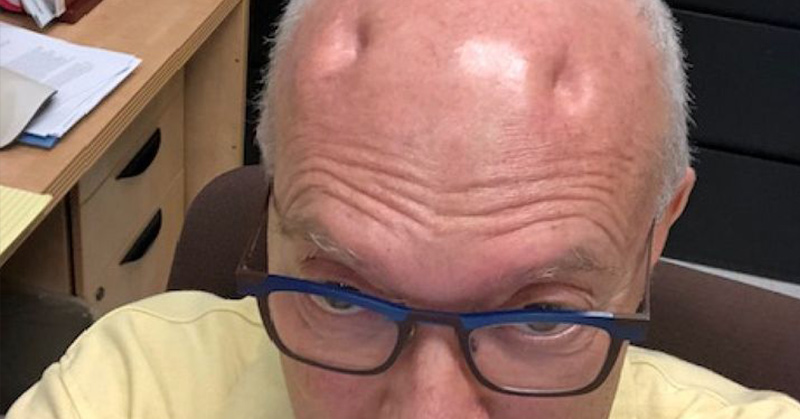William Felice is a passionate college professor who has been teaching and mentoring students for thirty years. He is a book author, has a loving husband, and is an all-around happy, fulfilled man.
After major surgery last summer, however, Felice was left with prominent markings that have made him feel profoundly insecure.
Appearance-Altering Surgery
In the summer of 2019, Felice was very busy- he was working hard in his role as a professor at Eckerd College in St. Petersberg, Florida, and he was in the process of authoring two books. Feeling passionate and fulfilled, there was only one thing plaguing him- constant headaches.
When over-the-counter pain medication ceased to help, and the pain gradually became unbearable, he went to see his doctor. A scan revealed the reason behind the headaches: bleeding on both sides of his brain, which can be life-threatening if left untreated.
The only solution was to have four holes drilled into his skull so that tubes could be inserted to drain the blood and other fluids. After spending a little over a week at St Anthony’s Hospital, Felice was finally able to go home. Thankfully, he was left with no neurological damage, however, the evidence of his surgery is clearly visible in the form of four significant dents on the top of his head.
The marks, according to Felice, create a “freakish sort of look” on his bald head, and have impacted his self-esteem [1].
Appearance and Self-Esteem
In most societies, there is an inextricable link between outward appearance and self-esteem. In fact, psychologists who have studied the factors that influence self-esteem have consistently found that outward appearance is at the top of the list, above job competence, peer likeability, or skill in another area [2].
Self-esteem and body image can change over time. Many adults who experience physical change later in life may experience a decrease in self-esteem as a result. This is mainly because our physical appearance is of particular importance to our identity. Any change, then, particularly if it is a change to the face, could lead to a sense of self-loss and ultimately an identity crisis [3]. Many people, as was the case with Felice, worry about how the change will be perceived by others.
“My reaction was to feel incredibly insecure and withdrawn. I worried about the image I would project to my friends, work colleagues and students. Would I now be judged by my scarred appearance?” explained Felice [1].
The Advantages of Being Attractive
Undesirable changes to your appearance could, unfortunately, have an impact on your life. In a society that values what you look like so heavily, being more or less attractive can affect the kinds of jobs you’re able to get, and even the amount you get paid.
There have been several studies that show that better-looking people are more likely to be offered a higher salary than their less-attractive coworkers [4]. An experiment in 2005 showed that employers looking at photos of potential employees were prepared to pay those who they perceived as better-looking 10.5 percent more than the others [5].
This is because, without even realizing it, we often consider outward appearance as an indicator of a person’s character. A study published in the Psychological Bulletin found that physically attractive people were perceived as more sociable, dominant, sexually warm, mentally healthy, intelligent, and socially skilled than physically unattractive people [6].
Felice is highly aware of this, and he plans to continue challenging his students to think about the way they perceive people and the reasons behind their assumptions or judgments.
“I will continue my life goal of being a “master teacher” and I know the pedagogical techniques I’ve mastered do not depend on my looks,” he said [1].
No longer having as much control over his outward appearance, Felice knows that it is up to him to try to accept and become more comfortable with his new look. He understands that there are countless others who have suffered disfigurements that are far worse than his, and his hope is that gradually as a society we will become less preoccupied and judgmental of people’s physical appearance [1].
Keep Reading: Douglas Adams’ Story Teaches a Powerful Lesson on Judging Others
Sources
- https://www.huffpost.com/entry/physical-disfigurement-anxiety_n_5e42cccdc5b6b708870816d6
- https://search.proquest.com/openview/0baa5034bbfbbfc478dae67106256c8b/1?pq-origsite=gscholar&cbl=33810
- https://www.changingfaces.org.uk/adviceandsupport/self-help/adults/appearance-self-esteem
- https://www.businessinsider.com/beautiful-people-make-more-money-2014-11#physically-attractive-workers-are-considered-more-able-by-employers-1
- https://dash.harvard.edu/bitstream/handle/1/3043406/mobius_beauty.pdf?s..
- https://psycnet.apa.org/record/1992-19831-001

